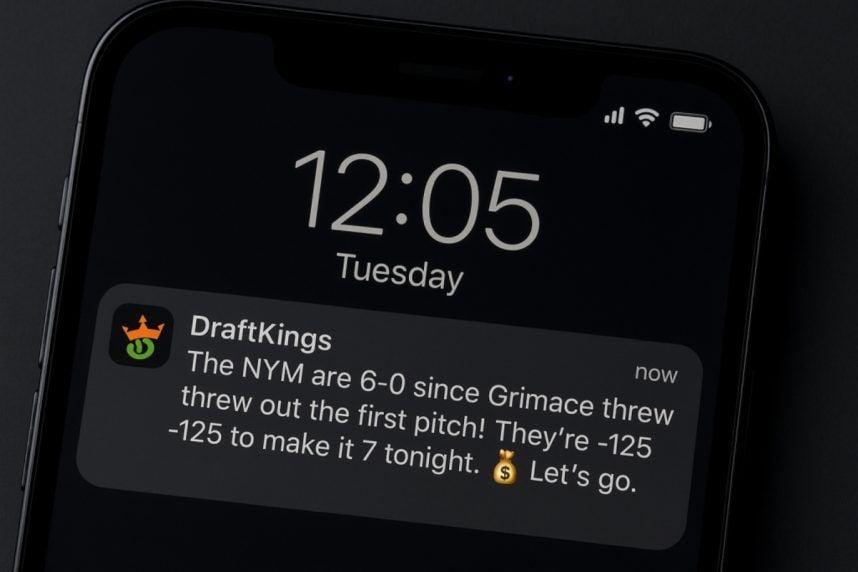Sports Betting Advertising Should Be Banned, Says National Consumers League
Posted on: August 1, 2025, 10:31h.
Last updated on: August 1, 2025, 10:33h.
- The National Consumers League is calling for a sports betting advertising ban
- The NCL takes issue with a mobile sportsbook’s ability to send push notifications
- Most push notifications include marketing messaging, a NCL report concludes
Sports betting advertising and the incessant tactics many online sportsbooks utilize are a threat to consumer health, a prominent national organization believes.

The National Consumers League (NCL) is calling for a prohibition on sports betting advertising. The nonprofit consumer organization, founded in 1899, cites a new report suggesting that 93% of smartphone push notifications sent by FanDuel, DraftKings, and BetMGM contained advertising material.
Of the sportsbook notifications, the NCL probe found that more than six in 10 messages encouraged the user to place a bet with messaging such as “bet now.” Dubbed “bet pushes,” the NCL says the use of app notifications for advertising and bet-inducing purposes is “extremely invasive” and should “not be normalized.”
Ad Ban Backed
The NCL, which is dedicated to empowering and protecting consumers in the marketplace, has encouraged the Federal Trade Commission (FTC) to investigate whether the use of app notifications for marketing purposes violates provisions of federal consumer protection laws. In the meantime, the group is asking state lawmakers and regulators to ban sports betting advertising.
The NCL supports the SAFE Bet Act, a federal bill that would ban sports betting ads between the hours of 8 a.m. and 10 p.m., and during all live sports programming. The statute, authored by U.S. Rep. Paul Tonko (D-NY) and Sen. Richard Blumenthal (D-CT), would additionally limit bettors to making five deposits a day and require sportsbooks to conduct “affordability checks” on customers making large or atypical bets.
Sports betting companies have 24/7 access to consumers through their phones, from the minute they wake up to the second they fall asleep. The government regulates advertising on television, email, and text messages. But when it comes to push notifications, something that’s arguably more effective than each of those older mediums, there are no protections,” said NCL Senior Public Policy Manager Eden Iscil.
The FTC defines deceptive business practices as something likely to “mislead a consumer acting responsibly.” An unfair business practice is the act of causing, or likely to cause, “substantial injury to consumers which is not reasonably avoidable by consumers themselves and not outweighed by countervailing benefits.”
As Dangerous as Tobacco?
In calling for a sports betting advertising ban, Iscil likened the emerging tech gaming industry to tobacco.
“The U.S. government (rightfully) considered the advertising of cigarettes over the radio to be too extreme and banned those marketing practices decades ago. Now, imagine if a tobacco company sends a text every day, multiple times a day, to encourage you to smoke their cigarettes. That is basically what sports betting apps are doing,” Iscil opined.
Iscil thinks companies shouldn’t have access to a consumer’s smartphone, as such push notifications “demand your attention.” He adds that sports betting is not a “typical product or service” in that its offering “has well-documented addictive and harmful effects, from increased rates of suicide and intimate partner violence to an elevated risk of bankruptcy.”
The American Gaming Association says its members, which include the three aforementioned sportsbook leaders, go to great lengths to ensure that customers bet responsibly.
A thriving gaming industry is built on a foundation of responsibility,” the AGA says.
Each AGA member has pledged to uphold the association’s Responsible Code of Conduct, which includes the promotion of responsible gaming.
Last Comments ( 2 )
Our nation's thriving gambling industry is built on a foundation of addiction -- across virtually all forms of gambling, a majority of gambling industry profits derive from gambling addicts and those who show enough signs of gambling addiction to be clinically considered "at risk."
No ban needed - people need to manage themselves more effectively. Stop making your own problems someone else’s. Time to grow up people!